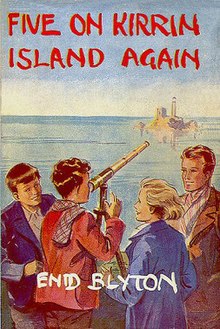| This article includes a list of references, related reading, or external links, but its sources remain unclear because it lacks inline citations. Please help improve this article by introducing more precise citations. (June 2021) (Learn how and when to remove this message) |
 Original 1947 first edition cover Original 1947 first edition cover | |
| Author | Enid Blyton |
|---|---|
| Cover artist | Eileen A. Soper |
| Language | English |
| Series | The Famous Five series |
| Genre | Mystery, Adventure novel |
| Publisher | Hodder & Stoughton |
| Publication date | October 1947 |
| Publication place | United Kingdom |
| Media type | Print (hardcover and paperback) |
| Preceded by | Five Go Off in a Caravan |
| Followed by | Five Go Off to Camp |
Five On Kirrin Island Again is the sixth novel in the Famous Five series by Enid Blyton. It was first published in October 1947.
Plot
Julian, Dick, Anne and George had planned to visit Kirrin Island for their school holidays, but George's father, Uncle Quentin, is using the island to conduct secretive scientific experiments.
George is frustrated with this idea, but agrees to lend her island to her father until he completes his experiment. Uncle Quentin is later kidnapped by villains wanting his secret formula for alternative energy. Uncle Quentin is held in a sub-sea tunnel and it is up to the Five to rescue him.
During the adventure, Timmy plays an essential part in rescuing Uncle Quentin from the kidnappers. The children befriend an artistic boy named Martin, whose guardian, Mr Curton, is part of the gang trying to steal the secret formula. After the rescue Martin is admitted to an Art School and is free from his guardian.
Adaptation
The book inspired a 2012 German film, Fünf Freunde.
External links
- Five On Kirrin Island Again at Faded Page (Canada)
- Five on Kirrin Island Again at www.enidblyton.net
- Enid Blyton Society page
| The Famous Five by Enid Blyton | |
|---|---|
| Enid Blyton novels |
|
| Film adaptations |
|
| Television adaptations |
|
| See also | |
This article about a children's novel of the 1940s is a stub. You can help Misplaced Pages by expanding it. See guidelines for writing about novels. Further suggestions might be found on the article's talk page. |